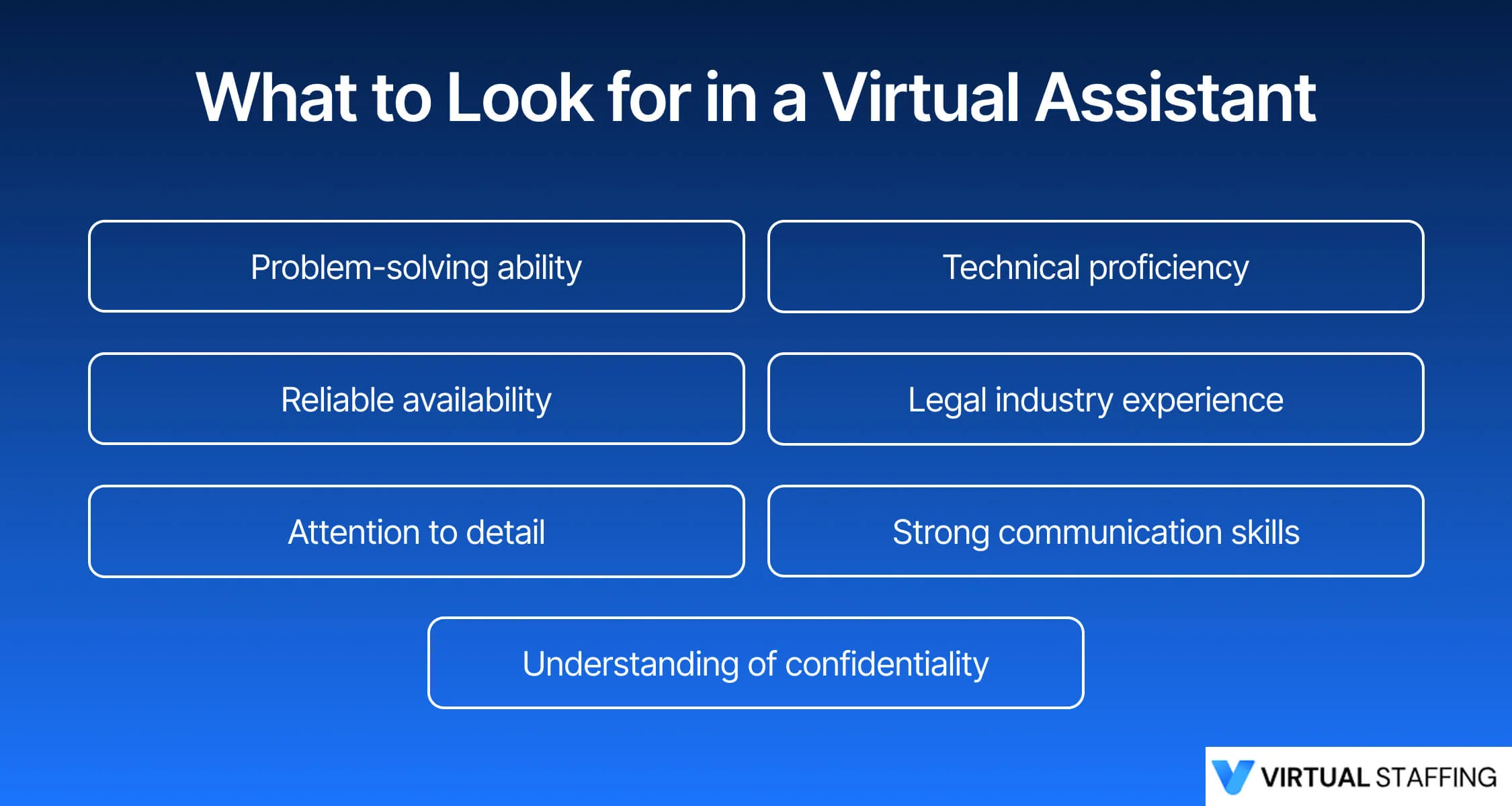As a lawyer, your most valuable commodity is your time. Yet, the demanding nature of legal practice often means countless hours are spent on client coordination, document management, and administrative tasks. While these tasks are necessary, they pull you away from billable hours and high-level strategy.
When paperwork piles up and your schedule becomes overwhelming, you might find yourself working late nights just to stay afloat. What if you could reclaim that time and refocus your energy on practicing law?
This is where a virtual assistant can completely transform the way you manage your practice. With 87% of law firms now embracing remote work, the legal industry is clearly shifting toward more flexible, efficient solutions. By leveraging expert virtual support, you can lighten your workload without the costs and complexities of traditional hiring.
You’re about to discover how this flexible solution can be the key to greater productivity, better client service, and a healthier work-life balance.
What is a Virtual Assistant for Lawyers
A virtual assistant for lawyers is a professional who provides administrative, technical, or specialized support to legal practices from a remote location outside the traditional office setup. These professionals use digital communication platforms and cloud-based tools to assist with various legal work.
They often handle responsibilities such as client intake, appointment scheduling, case management, legal research, and document preparation. Some virtual assistants specialize in legal support, bringing expertise in legal terminology, court filing procedures, and practice management software commonly used in law firms.
Virtual assistants typically operate as independent contractors or through staffing agencies. Unlike traditional in-house staff, they offer flexible arrangements that can easily scale according to a firm’s workload and budgetary needs.
10 Benefits of Hiring a Virtual Assistant
Adding a virtual assistant to your legal practice can address many of the operational challenges you face daily. From reducing overhead costs to improving client response times, the advantages extend across multiple areas of your practice.
Here are ten key benefits you can expect for your law firm:
1. Caseload Adaptability
Your workload as a lawyer rarely stays constant throughout the year. Virtual assistants provide the flexibility to scale support up or down based on your current needs. This is especially common in tax law practices that experience a surge in demand during tax season. When workloads increase, you can easily expand hours or bring on additional virtual support.
When things slow down, you can reduce hours without the complications of laying off employees. This adaptability means you’re not locked into fixed staffing costs during slower periods and can quickly respond to unexpected changes without lengthy hiring processes.
2. Cost Efficiency

One of the key advantages of hiring a virtual assistant is the significant cost savings compared to employing traditional in-house staff. You don’t need to provide office space, equipment, computers, or supplies. Additionally, you’re not responsible for employer-paid benefits such as health insurance, retirement contributions, or paid time off.
This leaner cost structure allows law firms to access professional support at a fraction of the cost of an in-office employee. It’s particularly valuable for solo practitioners and growing firms that need to manage budgets carefully while allocating resources to more critical areas of their practice.
3. Better Work-Life Balance

According to Bloomberg Law’s 2024 Attorney Well-Being Report, 52% of in-house and private practice lawyers experience burnout due to demanding workloads and long hours. Legal work often extends into evenings and weekends, leaving little time for personal life.
By working with a virtual assistant, you can create clearer boundaries between work and personal time. Delegating tasks to a remote professional ensures that you’re not spending late nights on administrative or routine legal work.
This separation helps reduce burnout and allows you to maintain the energy and mental clarity needed to balance professional and personal responsibilities. A sustainable work pace benefits not only your well-being but also the quality of service you provide to clients.
4. Access to Specialized Legal Skills
Many virtual assistants specialize in legal support and bring targeted expertise to your practice. You can find remote professionals experienced in specific areas such as personal injury, family law, or intellectual property.
Virtual assistants for lawyers are familiar with legal software, terminology, and procedures, as well as compliance requirements relevant to your field. Instead of spending time and money training a general administrative assistant, you can onboard a virtual assistant who contributes effectively from day one, handling complex legal tasks with minimal supervision and without extensive training.
5. Extended Business Hours
Remote work eliminates geographical constraints, giving law firms access to a global talent pool. By hiring virtual assistants in different time zones, your firm can extend its operational hours and maintain client responsiveness around the clock. With a virtual assistant providing extended availability, client calls can be answered, emails responded to, and administrative tasks completed outside traditional 9-to-5 hours.
This allows lawyers to have peace of mind knowing that clients can reach the firm and receive timely responses beyond standard business hours. Extended availability also gives you a competitive advantage over firms that remain accessible only during limited hours.
6. Faster Document Turnaround

Legal documents are the backbone of the legal system, they form the basis for legal proceedings and establish the rights and responsibilities of individuals. However, the volume of documentation in each case can be substantial, and managing it efficiently is no easy task.
A virtual assistant for lawyers can take on critical responsibilities such as document preparation, filing, and organization. Since these professionals work remotely, it’s common to find virtual assistants who are highly proficient in both modern and traditional document management systems.
With dedicated virtual support, your firm can meet deadlines more comfortably, respond to client needs faster, and maintain accuracy throughout the process. Faster turnaround times not only enhance client satisfaction but also allow you to take on more cases without compromising quality.
7. Increased Efficiency
Administrative tasks can consume hours that could otherwise be spent on billable work or client development. By delegating non-billable administrative duties to a virtual assistant, you can dedicate more time to legal strategy, case preparation, client counseling, and other high-value activities that directly impact your firm’s efficiency.
The result is not only more billable hours but also improved work quality, since you can dedicate your attention to complex legal matters rather than splitting focus with routine administrative interruptions.
8. Specialized Client Communication
Effective communication is essential in any profession, but it holds particular importance in the legal field. Lawyers must navigate complex legal systems, present persuasive arguments, and advocate for their clients’ rights. In most law firms, an administrative professional serves as the first point of contact, making this stage of the client journey crucial.
A virtual assistant can manage these communications with a modern, specialized approach. Instead of relying on a general administrative professional, you can hire a remote expert who understands legal terminology, processes, and your specific area of practice.
These remote professionals can effectively handle lead qualification, client intake, and appointment scheduling. Their legal-specific communication skills help reduce client anxiety, improve the intake process, and strengthen client relationships, often leading to better reviews and more referrals for law firms.
9. Increased Work Productivity

Virtual assistant arrangements eliminate common productivity drains found in traditional office settings. Most virtual staffing providers offer pay-for-productivity models where you're billed only for actual working hours rather than idle time, break periods, or non-productive moments. You receive focused, task-oriented work without paying for the downtime inherent in traditional employment.
Remote work arrangements also remove office politics and workplace distractions that often reduce efficiency. Without water cooler conversations, unnecessary meetings, or interpersonal conflicts to navigate, virtual assistants can maintain sustained focus on the tasks you've assigned, delivering more completed work per hour than you might see from in-office staff.
10. Scalable Support for Growth
As your practice expands, your caseload and administrative demands increase as well. Virtual assistants offer a scalable solution that grows alongside your firm. You can start with part-time remote support and gradually add more hours or additional assistants with different specializations as your workload grows.
This gradual scaling is far more manageable than hiring, training, and committing to full-time in-house employees. You maintain full control over your growth pace while ensuring that your firm always has the right level of support at each stage. This flexibility helps reduce growing pains and supports long-term, sustainable expansion.
What to Look for in a Virtual Assistant

Successfully integrating a virtual assistant into your legal practice depends on finding the right fit. While basic administrative skills are important, working within a law firm environment requires additional qualifications to perform efficiently in a remote setting. Consider these seven key factors when selecting a virtual assistant for your firm:
- Problem-solving ability: One of the most valuable qualities in a virtual assistant is the ability to take initiative and solve routine problems independently. Look for candidates who demonstrate resourcefulness, sound judgment, and the ability to handle unexpected situations appropriately without requiring constant oversight.
- Technical proficiency: Because virtual assistants rely heavily on technology to perform their work remotely, it’s essential that they’re comfortable using legal practice management software, document management systems, video conferencing platforms, and productivity tools. Technical proficiency ensures seamless collaboration and task completion.
- Reliable availability: Given the remote nature of the role, a virtual assistant must be proactive and dependable. They should manage their time effectively, maintain consistent working hours, and meet deadlines without constant supervision. It’s also important that they have backup plans for handling emergencies or unexpected absences to ensure continuous support.
- Legal industry experience: A virtual assistant with prior legal experience understands the unique demands and terminology of legal practice. They’re familiar with legal document formats, court procedures, client confidentiality requirements, and the general workflow of legal matters. This background significantly reduces training time and minimizes errors.
- Attention to detail: In the legal field, accuracy is paramount. Even small errors can have serious consequences. Look for assistants who demonstrate meticulous attention to detail in document preparation, data entry, deadline tracking, and all other administrative tasks your practice requires.
- Strong communication skills: Clear written and verbal communication is a must, as virtual assistants often serve as the first point of contact for clients or opposing counsel. They must convey professionalism, relay messages accurately, and represent your firm well in every interaction, whether via email, phone, or client portals.
- Understanding of confidentiality: Virtual assistants must understand and respect attorney-client privilege as well as all confidentiality requirements. They should be willing to sign non-disclosure agreements and follow secure data-handling practices to protect sensitive client information. More importantly, they should be familiar with and adhere to the security and safety standards that govern the operations they perform.
Get Started with a Virtual Assistant from Virtual Staffing
If you’re ready to reclaim your time and optimize your practice, Virtual Staffing can connect you with skilled virtual assistants who understand the demands of the legal industry. We offer a wide network of qualified candidates you can browse to find the best fit for your firm’s unique needs.
Contact us today to learn how we can help you build a more efficient, productive, and scalable law practice.





